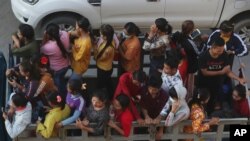The Cambodian government has allocated $1.2 billion to bolster an economy struggling with the withdrawal of some European trade perks and the COVID-19 pandemic.
Under its Everything But Arms policy, the European Union grants tariff-free access for goods from developing countries that meet international standards on democracy.
But a ban on the main opposition party from contesting the 2018 election upset the EU – Cambodia’s largest export market – prompting the withdrawal and an initial cost to business of about $130 million.
Phen Kosal has worked at the Hung Wah garment factory for last six years. She said the EBA policy was having a dreadful impact on business amid layoffs, loss of overtime and reduced hours.
She said she is now begging for government help. She is also in debt with the banks and finance institutions and added that this was why she was desperately seeking aid.
Hardest hit is the $7 billion garment industry, where about 700,000 workers earn $190 a month producing for big brands such as Levi Strauss and Adidas.
The Garment Manufacturers Association says the EU erred by withdrawing preferences on August 12 amid the COVID-19 pandemic and that 450 factories have suspended work. It says another 83 have closed, hurting about 150,000 workers.
Athit Kong is president of the Coalition of Cambodian Apparel Workers’ Democratic Union. He said the combination of EBA and the pandemic is costing jobs, and if the situation does not improve then big brands might look for other countries to produce their garments.
“I think the parties need to work together to maintain and to keep this benefit for the country, and especially for the workers,” he said.
But the plight of workers remains uncertain, and that is unlikely to change amid lost trade and the pandemic.




